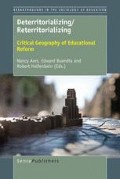Abstract
We placed this chapter at the beginning of the book to emphasize the importance of the question, “whose land are we talking about?” Indeed, the very question of ownership is one Tuck and Guess remind us is open to challenge. Beginning with this chapter, we are signaling to readers that the spaces that we are writing about in the book are Indigenous spaces that have been violently overlaid with colonizing practices, actions, images, etc.
Access this chapter
Tax calculation will be finalised at checkout
Purchases are for personal use only
Preview
Unable to display preview. Download preview PDF.
References
Benton, L. (2004). “Colonizing Hawai’i” and colonizing elsewhere: Toward a history of U.S. imperial law. Law & Society Review, 38(4), 835–842. Retrieved from http://www.jstor.org/stable/1555093
Colwell-Chanthaphonh, C. (2005). The incorporation of the native American past: Cultural extermination, archaeological protection, and the antiquities act of 1906. International Journal of Cultural Property, 12(3), 375–391. doi:10.1017/S0940739105050198
Fanon, F. (2004). The wretched of the Earth (R. Philcox, Trans.). New York, NY: Grove Press. (Original work published 1961)
Glauner, L. (2001). Need for accountability and reparations: 1830–1976 the United States government’s role in the promotion, implementation, and execution of the crime of genocide against native Americans. The DePaul Law Review, 51, 911.
Gordon, L. R. (Ed.). (1997). Existence in Black: An anthology of Black existential philosophy. New York, NY: Routledge.
Lefevre, T. A. (2015). Settler colonialism. Retrieved November 16, 2016, from http://www.oxfordbibliographies.com/view/document/obo-9780199766567/obo-9780199766567-0125.xml
McKiernan-Gonzalez, J. (2014). Mexican American colonization during the nineteenth century: A history of the US-Mexico borderlands. Denton, TX: Texas State Historical Association. doi:10.1353/swh.2014.0082
Shelton, D. (2004). World of atonement reparations for historical injuries. Miskolc Journal of International Law, 1, 259.
Thompson, W. L. (1989). The introduction of American law in the Philippines and Puerto Rico 1898–1905. Fayetteville, AR: University of Arkansas Press.
Author information
Authors and Affiliations
Editor information
Editors and Affiliations
Rights and permissions
Copyright information
© 2017 Sense Publishers
About this chapter
Cite this chapter
Ares, N. (2017). Tuck and Guess’ Foundational Question. In: Ares, N., Buendía, E., Helfenbein, R. (eds) Deterritorializing/Reterritorializing. Breakthroughs in the Sociology of Education. SensePublishers, Rotterdam. https://doi.org/10.1007/978-94-6300-977-5_3
Download citation
DOI: https://doi.org/10.1007/978-94-6300-977-5_3
Publisher Name: SensePublishers, Rotterdam
Online ISBN: 978-94-6300-977-5
eBook Packages: EducationEducation (R0)

